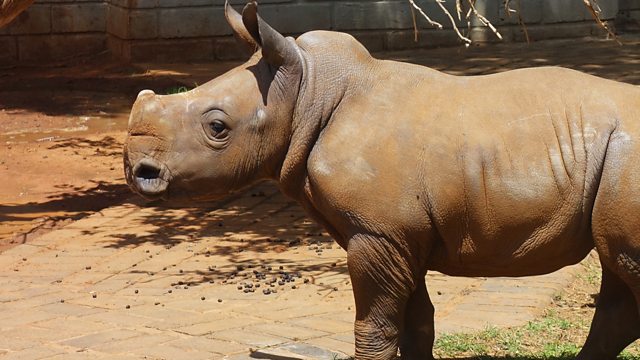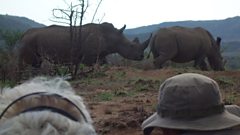The Horns of a Dilemma
Professor Adam Hart investigates the idea of selling harvested rhino horn in South Africa and asks if it could help stop poaching.
The majority of white and black rhinoceros are found in South Africa. This stronghold for these magnificent creatures is now being threatened by poachers killing rhino for their horns.
Rhino horn, traded illegally in parts of Asia, is thought to be a cooling agent in traditional Chinese medicine. It's recently been hailed as a cure for cancer, and is seen as a status symbol in Vietnam. Made from keratin, the same stuff as hair or fingernails rhino horn has negligible medical properties, yet people are willing to pay up to 拢40,000 a kilogramme for it.
International trade in rhino horn has been banned under CITES (Convention on International Trade in Endangered Species) since the 1990s. Trade in horn was banned within South Africa in 2009. Since then, poaching has increased exponentially, reaching more than 1300 rhino poached in 2015.
Protecting the rhino in National and Provincial parks and privately owned reserves is a very dangerous and expensive undertaking. The government-run parks, such as Kruger National Park have about 75% of the South African rhino and are losing the most animals to poachers. The best protected rhino tend to be in the privately owned farms.
Many private rhino owners want the ban on the sale of rhino horn to be lifted.
This is because, unlike elephant ivory, pangolin scales and the bones from lions, rhinos can be dehorned without harming the animal. Many rhino owners are already removing the horns from their animals to stop them attracting poachers so they are sitting on stockpiles of harvested horn.
With education and demand-reduction schemes not working quickly enough rhino owners hope to satisfy the demand by legally selling harvested horn. Some just want to trade within South Africa while others want CITES to allow a trade agreement between South Africa and China or Vietnam. They say they would use the money earned to put back into conserving and protecting rhino.
Others worry that this would just increase demand for horn and that by making trade legal, you are making people think that it has medical benefit.
It's a huge dilemma.
Producer: Fiona Roberts.
Last on
Clips
-
![]()
The Slaughter of a Rhino
Duration: 05:42
-
![]()
Bachelor group of Rhinos
Duration: 00:46
-
![]()
Mother and son white Rhino
Duration: 01:12
Broadcasts
- Tue 22 Mar 2016 11:00大象传媒 Radio 4
- Mon 28 Mar 2016 21:00大象传媒 Radio 4
Featured in...
![]()
The Archive—Seriously...
Seriously interesting documentaries from Radio 4.







